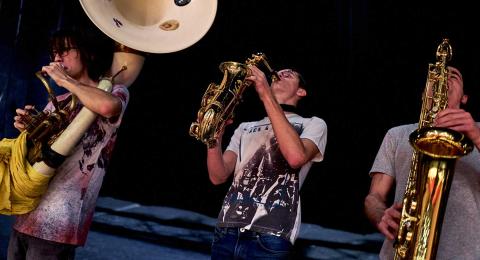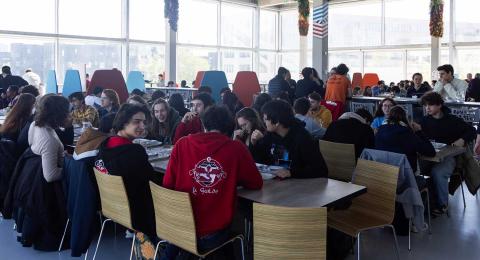The Master's degree in Plant Sciences consists of two sub-tracks:
The Research sub-track is a programme of excellence that trains experts in advanced fundamental knowledge of how plants function and interact with the environment.
The Professional sub-track 'Innovation and Quality in Plant Production' (IQPV) is a programme of excellence that trains experts in crop health and protection, varietal selection, seeds and sustainable agronomy.
The Research sub-track is organised into 8 teaching units:
- 5 fundamental knowledge teaching units (semester 1, 16 ECTS): Plant genomics and breeding, Plant response to their complex environment, Plant epigenetics, Plant cell biology, Metagenomics
-4 teaching units on research projects (semester 1, 14 ECTS): Laboratory rotations, Omics approaches to plant metabolism, Research project, International congress.
A 6-month internship is carried out in a research laboratory (30 ECTS, from January to June).
The IQPV sub-track programme is organised into 7 teaching units:
-3 scientific teaching units (semester 1, 15 ECTS): Genomics and plant breeding, Plant health, Agricultural practices and climate change;
-4 entrepreneurial teaching units (semester 1, 15 ECTS): Market research and marketing, Tools for business development, Approval of plant protection products, Strategic and regulatory monitoring
A 6-month end-of-study internship is carried out in a company (30 ECTS, from March to September).
Information
Skills
At the end of the sub-track research, students will have acquired the following skills:
• Explain and use basic concepts in plant genomics and breeding, plant signalling, plant physiology and metabolism, plant cell biology and plant epigenetics
• Identify and select appropriate scientific or technological approaches to address a biological question in plant sciences
• Gather and summarise literature on a specific subject in plant sciences
• Conceive, plan for and produce a scientific project in plant sciences in a research lab: synthesis of the literature, independent and rigorous organization of lab experiments, analysis of scientific results and reporting (written and oral restitution).
Upon completion of the IQPV Professional sub-track's programme, students will have acquired the following skills:
• Explain and apply, in a professional context, the basic concepts associated with genomics and plant breeding, plant health and innovation in agricultural practices, with a view to setting up plant production projects aimed at helping crops adapt to climate change.
• Identify and select the most relevant scientific and/or technological approaches to address a specific question or issue in plant sciences.
• Compile and synthesise bibliographic and regulatory data on a specific scientific or economic issue in plant sciences, applying a critical eye.
• Design, plan and produce a scientific project in a plant sector company by applying the knowledge acquired in plant sciences, based on an analysis of the scientific literature and by independently and rigorously organising the experimental aspects or field missions, analyses and their synthesis within the allocated time
• Identify the tools necessary for successful professional integration and apply them to best prepare for one's professional project.
Objectives
The Research track is taught entirely in English and aims to train students, through research, to acquire solid expertise in plant sciences and in the mechanisms used by plants to adapt to abiotic and biotic stresses. Graduates continue their studies under doctoral contracts, mainly in public laboratories, but also in private companies. The programme is divided into two parts: courses (September-December), consisting of teaching units and laboratory immersion, and training (January-June), consisting of a six-month internship in a public research laboratory.
The aim of the IQPV professionnal subtrack's programme is to enable students to acquire a solid scientific foundation in fields related to plant production. This knowledge base will enable them to implement a rigorous scientific approach combined with appropriate experimental methods in the context of real-world issues. It will draw on generic knowledge and transfer it to an agricultural/agronomic context in order to improve plant production in a changing environment and under conditions of sustainable agriculture.
Career Opportunities
Career prospects
Après un Master ou Master + Doctorat : ingénieur (R&D, contrôle, production…)
Après un Master ou Master + Doctorat : ingénieur (recherche-développement, contrôle, production…) dans les domaines santé, pharmacie, agroalimentaire, biotechnologies, instruments et réactifs, cosmétique, dépollution et environnement
Après Master + Doctorat : chercheur ou enseignant-chercheur
Après un Master ou Master + Doctorat : ingénieur (recherche et développement, contrôle, production…)
Ingenieur R&D
Responsable de projets R&D
Responsable de projets R et D
Ingénieur d'études industrie / recherche publique
Enseignants-chercheurs
Ingénieur.e recherche & développement
Ingénieur.e en production
Ingénieur de recherche ou d'études
Ingénieur d'études
Ingénieur de recherche
After Master and PhD : reseacher or assistant professor or professor
Chargé de missions
Chargé de projet
Ingénieur d’études
Further Study Opportunities
Doctorat
PhD
Master Biologie agrosciences
Master of Sciences biotechnologies et management
Master Métiers de l'Éducation et de l’Enseignement
Fees and scholarships
The amounts may vary depending on the programme and your personal circumstances.
Admission Route
Capacity
Available Places
Target Audience and Entry Requirements
Candidates for the training programme must have completed a Master's degree in biology with a solid foundation in plant biology and physiology, genetics and genomics, plant-microorganism interaction biology, and statistics.
Application Period(s)
From 15/02/2026 to 10/06/2026
Supporting documents
Compulsory supporting documents
Copy diplomas.
Copy of identity document.
Motivation letter.
All transcripts of the years / semesters validated since the high school diploma at the date of application.
Curriculum Vitae.
Additional supporting documents
Letter of recommendation from a trainee.
Certificate of English level.
Certificate of French (compulsory for non-French speakers).
VAP file (obligatory for all persons requesting a valuation of the assets to enter the diploma).
Recommendation letters.
Document indicating the list of local M2 choices available here : https://urlz.fr/i3Lo.
Supporting documents :
- Residence permit stating the country of residence of the first country
- Or receipt of request stating the country of first asylum
- Or document from the UNHCR granting refugee status
- Or receipt of refugee status request delivered in France
- Or residence permit stating the refugee status delivered in France
- Or document stating subsidiary protection in France or abroad
- Or document stating temporary protection in France or abroad.










